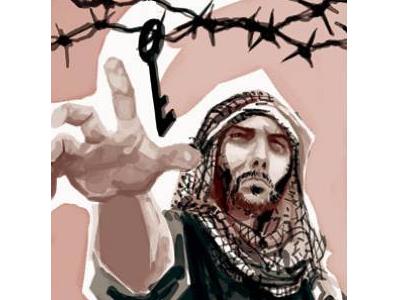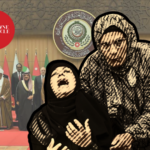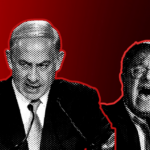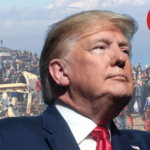Al Nakba, An Unforgiving Reality

(Image Credit: Niño Jose Heredia/Gulf News)
By Ramzy Baroud, Special to Gulf News
It is essential that when we remember Al Nakba, we do not confine our mourning simply to what has been lost. We also need to understand the nature and magnitude of that loss, and what it continues to mean for so many.
On May 15, Palestinians worldwide commemorated Al Nakba, or the Catastrophe of 1947-48. They were joined by millions of Arabs, Muslims and sympathetic communities as they remembered the infamous date which marks the destruction of Palestine, and the establishment of the Israeli state.
It is essential that when we remember Al Nakba, we do not confine our mourning simply to what has been lost. We also need to understand the nature and magnitude of that loss, and what it continues to mean for so many.
There is no escaping the fact that without the help and support of colonial Britain, Israel would not have found existence atop hundreds of destroyed Palestinian villages and towns. While Britain was entrusted with an international ‘Mandate’ over Palestine, to aid in the process of state-building towards complete political independence, it decidedly betrayed this promise.
Britain and France were at one point the two major colonial powers in the Middle East. They divided up the region with sheer disregard for the national dignity of its peoples. The May 1916 secret treaty, known as the Sykes-Picot agreement, is a prime example.
Deciding the fate of other countries, the treaty between Britain, France and Russia determined the fate of Palestine as a largely internationalised territory — and not a country for the Palestinians, as expected from the Mandate.
Shortly after, in November 1917, the British secretary of State wrote a letter to a leading British Zionist, in which he promised Palestine as a national home for the Jews. What was then to be the future of the Palestinians, who were increasingly referred to as the ‘non-Jewish’ residents of Palestine?
For nearly three decades, the British had safeguarded the process that would eventually lead to the establishment of the Jewish state. British policy had long supported mass Jewish immigration to Palestine.
By the end of 1947, as the United Nations was assuming a greater role in Palestine, the indigenous Palestinian Arab majority was estimated at two-thirds of Palestine’s total population. The rest were Jewish newcomers. At the start of the Mandate, Palestinian Arabs had comprised 90 per cent of the population. Britain’s role in the ethnic cleansing that followed can hardly be contested.
However, the land was still mostly Palestinian. All the shady purchases that took place during and even prior to the Mandate years and all the land seized illegally could not change this simple fact.
Land Ownership
The population may have become ‘mixed’ due to the pro-Zionist policies of Britain, but land ownership was hardly mixed. In fact, "almost all the cultivated land in Palestine was held by the indigenous population (while) only 5.8 per cent percent was in Jewish ownership in 1947," wrote Ilan Pappe in the Ethnic Cleansing of Palestine.
The above numbers seemed to matter to no one, save the Palestinians. The United Nations General Assembly — under intense pressure from the US government and president Harry Truman himself — voted in favour of Resolution 181, recommending the partition of Palestine into three entities — a Jewish state, a Palestinian state, and an international regime to govern Occupied Jerusalem.
While the British proposal of 1937 (which served as the basis for the UN Partition of Palestine) angered the Arabs, the UN resolution caused almost total dismay, as it allocated 5,500 square miles to the proposed Jewish state, and only 4,500 square miles to Palestinians — who owned 94.2 per cent of the land and represented two-thirds of the population. The fact that only 600 square miles of the proposed Jewish state were actually owned by Jews mattered little to the 33 member states who voted in favour of partition.
While the Zionist leadership was hardly satisfied with the UN’s iniquitous division, here was a milestone worthy of festivities. Now the international community, led or coerced by the US, was championing the Zionist vision with unprecedented generosity.
Palestinians and Arabs, who had hoped that the US, with its constant emphasis on self-determination, would shift the slanted British policy in favour of Arabs, experienced yet another rude awakening. Any little chance for sanity seemed to have vanished.
As Palestinians were reaching the imminent conclusion of an approaching war, the Zionist leadership was finalising a plan to take over the whole of Palestine. The main Zionist fighting force was the Haganah, under the command of the Jewish Agency.
The latter already functioned as a government, the former as an army. Meanwhile, the Anglo-American Committee estimated Zionist military preparedness in a 1946 report at 62,000 well-trained fighters. There was no mention whatsoever of Palestinian readiness.
The ethnic cleansing of Palestine began immediately after the Partition Plan was adopted by the UN. In December, 1947, supposedly reacting to Palestinian riots protesting the partition of their country, Zionist attacks on Palestinian areas resulted in the exodus of 75,000 people.
The delayed Arab response to calls for help left the Palestinian population most vulnerable. Hundreds of thousands more refugees followed, robbed of all they had and left in a state of total despair.
The outcome of all of these events cannot be discounted. Thousands of lives have been lost. Hundreds of villages have been wiped off the map. Generation after generation of Palestinians have since continued to reel under the pain of past memories, the hardship of today’s realities, and an uncertain future.
Indeed, Al Nakba is not a mere occasion to commemorate. It is also an unforgiving reality which can only be escaped through the realisation of justice. Nothing else could suffice.
– Ramzy Baroud is an internationally-syndicated columnist and the editor of PalestineChronicle.com. His latest book is My Father Was a Freedom Fighter: Gaza’s Untold Story. (This article was published in Gulf News)










































0 Comments